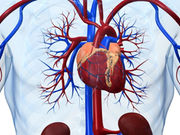Intrastudy stabilization, increase in eGFR linked to reduced MCVE rate in atorvastatin-treated patients
FRIDAY, April 1, 2016 (HealthDay News) — For statin-treated patients with coronary heart disease (CHD), stabilization or improvement in renal function is associated with a reduced rate of major cardiovascular events (MCVEs), according to a study published in the April 15 issue of The American Journal of Cardiology.
James Shepherd, M.D., from the University of Glasgow in the United Kingdom, and colleagues randomized patients with CHD to atorvastatin 10 or 80 mg/day and followed them for 4.9 years in the Treating to New Targets (TNT) study. The authors examined the correlation between intrastudy change in estimated glomerular filtration rate (eGFR) from baseline and the risk of MCVEs among 9,500 patients stratified according to renal function (improving, stable, and worsening).
The researchers found that, compared to patients with worsening kidney function, a lower rate of MCVEs was seen for patients with stable kidney function (hazard ratio, 0.72; P = 0.0005) and improving kidney function (hazard ratio, 0.36; P < 0.0001). The absolute reduction in the rate of MCVEs was 2.7 percent for each 1 ml/min/1.73² increase in eGFR. The absolute MCVE rate reduction per 1 ml/min/1.73² increase in eGFR was 2.0 and 3.3 percent for 10 and 80 mg atorvastatin, respectively.
“In conclusion, intrastudy stabilization or increase in eGFR in atorvastatin-treated patients with CHD from the TNT study was associated with a reduced rate of MCVEs,” the authors write. “Statin-treated CHD patients with progressive renal impairment are at high risk for future cardiovascular events.”
Several authors disclosed financial ties to pharmaceutical companies, including Pfizer, which funded the TNT study.
Copyright © 2016 HealthDay. All rights reserved.








